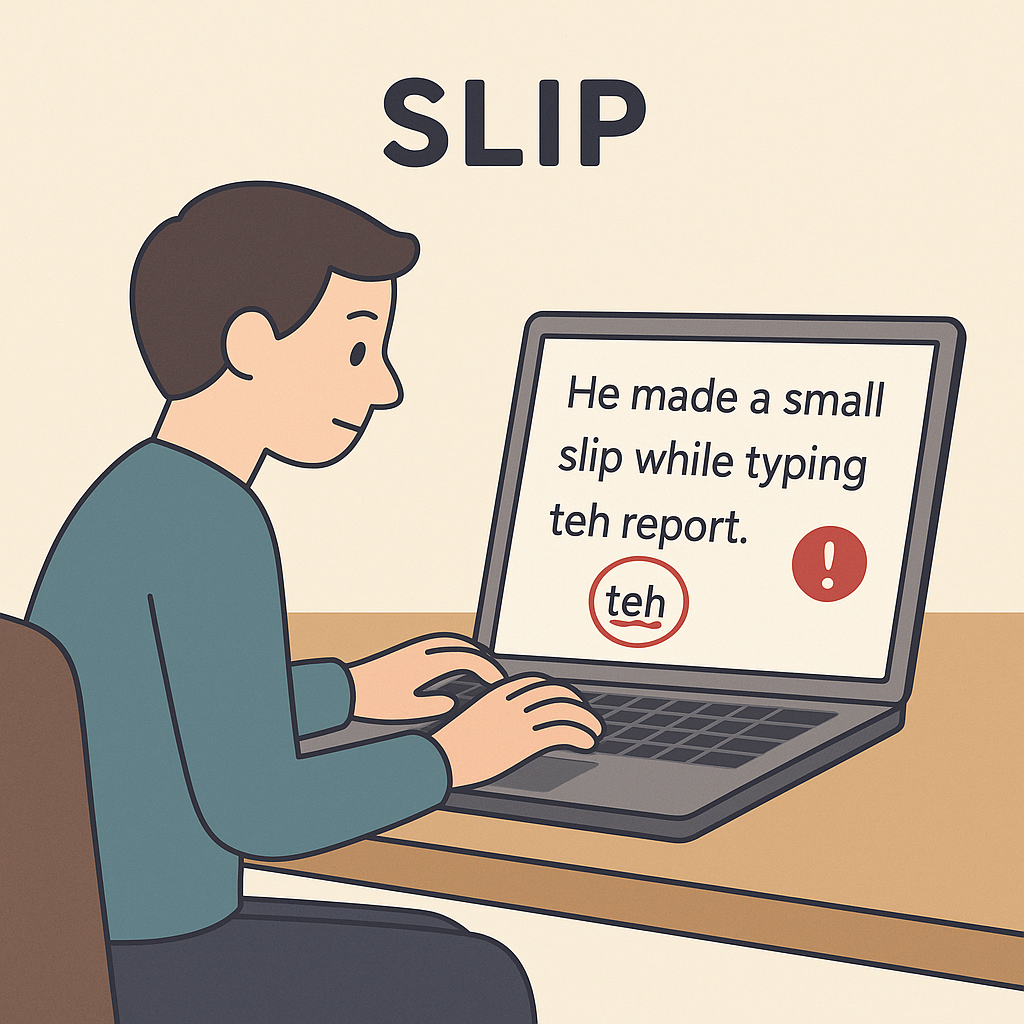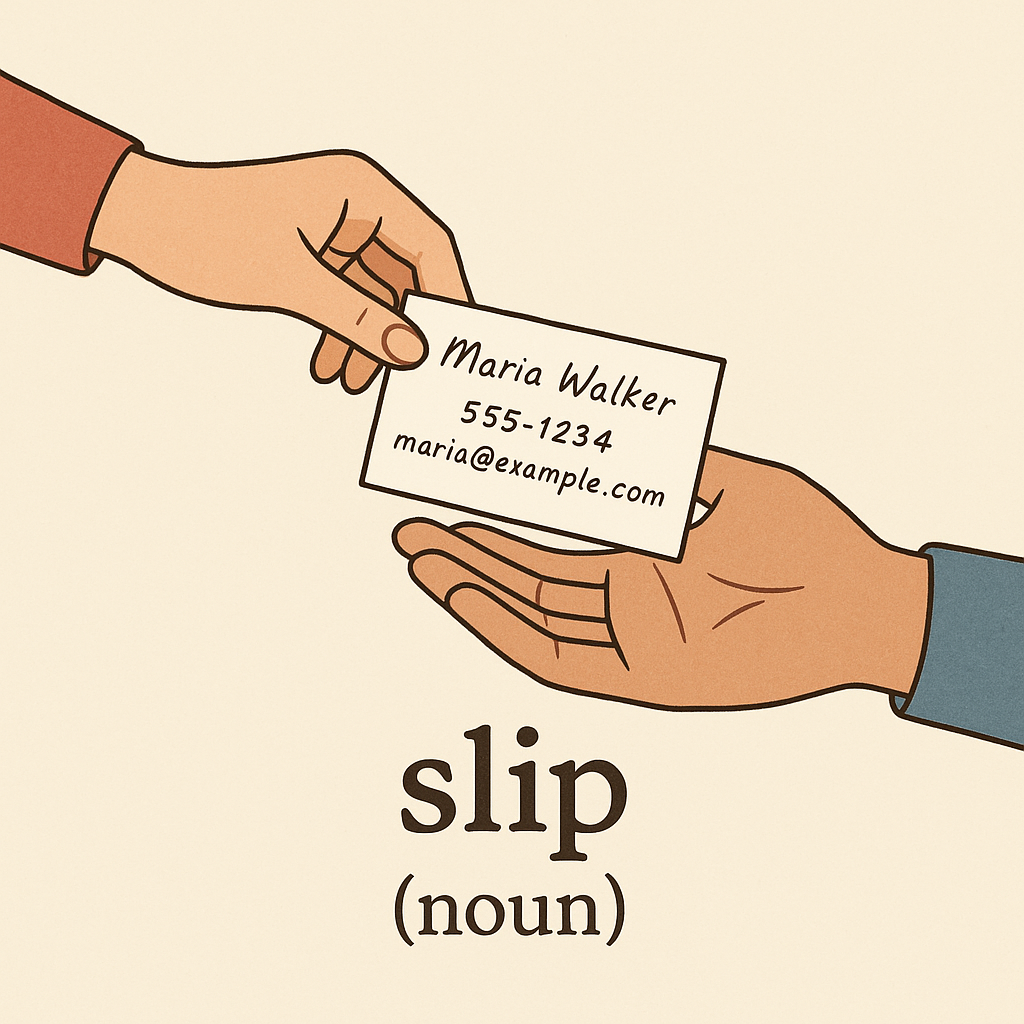Slip
Definition
The term "slip" refers to an act of sliding unintentionally, a mistake, or a small piece of material. It can also refer to the action of moving quietly or quickly.
Parts of Speech
- Noun
- Verb
Pronunciation
American English
- IPA Pronunciation: /slɪp/
- Respelling: SLIP
British English
- IPA Pronunciation: /slɪp/
- Respelling: SLIP
Etymology
The word "slip" originates from Middle English "slippen," derived from Old Norse "sleppa," meaning "to let go" or "escape." Its usage has evolved to include both literal and figurative meanings in modern English.
Derivatives
- Slippery (adjective)
- Slip-up (noun)
- Slippage (noun)
- Slipstream (noun)
- Slipped (verb, past tense)
Synonyms
- Slide
- Fall
- Mistake
Antonyms
- Grip
- Hold
- Correction
Usage
The term "slip" is used in various contexts, from describing unintentional movements to denoting minor errors or thin materials. For example: "He made a slip on the icy pavement," or "She wore a silk slip under her dress."
Related Terms
- Slide: To move smoothly over a surface.
- Trip: To stumble or cause to fall.
- Error: A mistake or oversight.
Detailed Definitions
Noun
- An act of sliding unintentionally: Refers to losing one’s footing and sliding.
- Example: "Her slip on the wet floor resulted in a minor injury."
- A minor mistake or error: Refers to an unintentional oversight or blunder.
- Example: "He made a small slip while typing the report."
- A small piece of paper or material: Refers to a thin, often rectangular piece of something.
- Example: "She handed him a slip with her contact information."
Verb
- To slide unintentionally: Refers to losing balance or footing.
- Example: "He slipped on the icy path."
- To move quietly or quickly: Refers to sneaking or gliding without notice.
- Example: "She slipped out of the room unnoticed."
- To make a small mistake: Refers to committing a minor error.
- Example: "He slipped in his speech but quickly recovered."
slip



🇨🇳 Mandarin
- 滑倒 (to slip) - huádǎo
- IPA: /xwa˨˩˦.tau˥˥/
- Respelling: hwa-dau
- 小票 (slip of paper) - xiǎo piào
- IPA: /ɕjɑʊ̯˨˩˦ pʰjɑʊ̯˥˥/
- Respelling: shyaou piau
🇮🇳 Hindi
- फिसलना (to slip) - phisalna
- IPA: /pʰɪsəlna/
- Respelling: phi-sal-na
- रसीद (slip of paper) - raseed
- IPA: /ɾəsiːd/
- Respelling: ra-seed
🇪🇸 Spanish
- Resbalar (to slip) - resbalar
- IPA: /res.baˈlar/
- Respelling: res-ba-lar
- Nota (slip of paper) - nota
- IPA: /ˈnota/
- Respelling: no-ta
🇫🇷 French
- Glisser (to slip) - glisser
- IPA: /gli.se/
- Respelling: gli-se
- Fiche (slip of paper) - fiche
- IPA: /fiʃ/
- Respelling: fish
🇸🇦 Modern Standard Arabic
- ينزلق (to slip) - yanzaliq
- IPA: /janzaːliq/
- Respelling: yanzaaleeq
- وصلة (slip of paper) - wasla
- IPA: /waːsˤla/
- Respelling: waasla
🇧🇩 Bengali
- স্লিপ (to slip) - slip
- IPA: /slip/
- Respelling: slip
- রশিদ (slip of paper) - rashid
- IPA: /ɹaʃid/
- Respelling: rashid
🇷🇺 Russian
- Скользить (to slip) - skol'zit'
- IPA: /skɐˈlʲzʲɪtʲ/
- Respelling: sko-l'y-zit'
- Чек (slip of paper) - chek
- IPA: /tʃek/
- Respelling: chek
🇵🇹 Portuguese
- Escorregar (to slip) - escorregar
- IPA: /iʃkoɾɣɐˈɾaɾ/
- Respelling: ish-kor-gha-rar
- Nota (slip of paper) - nota
- IPA: /ˈnɔtɐ/
- Respelling: no-ta
🇮🇩 Indonesian
- Meluncur (to slip) - meluncur
- IPA: /məluntʃur/
- Respelling: me-lunch-ur
- Slip (slip of paper) - slip
- IPA: /slip/
- Respelling: slip
🇩🇪 German
- Rutschen (to slip) - rutschen
- IPA: /ˈʁʊtʃən/
- Respelling: roo-chen
- Quittung (slip of paper) - quittung
- IPA: /kviˈtʊŋ/
- Respelling: kvi-tung
🇯🇵 Japanese
- スリップする (to slip) - surippu suru
- IPA: /sɯɾippɯ sɯɾɯ/
- Respelling: su-rippu su-ru
- スリップ (slip of paper) - surippu
- IPA: /sɯɾippɯ/
- Respelling: su-rippu
🇻🇳 Vietnamese
- Trượt (to slip) - trượt
- IPA: /ʈʂwəːt˧˧/
- Respelling: trw-uht
- Phiếu (slip of paper) - phiếu
- IPA: /phiəw˧˩/
- Respelling: phi-eu
🇰🇷 Korean
- 미끄러지다 (to slip) - mikkeureojida
- IPA: /mik͈ɯɾʌdʑida/
- Respelling: mikk-u-reo-ji-da
- 슬립 (slip of paper) - seulip
- IPA: /sɯɾipɯ/
- Respelling: su-ri-pu
🇹🇷 Turkish
- Kaymak (to slip) - kaymak
- IPA: /kajmak/
- Respelling: kai-mak
- Fiş (slip of paper) - fiş
- IPA: /fiʃ/
- Respelling: fish
🇵🇰 Urdu
- پھسلنا (to slip) - phisalna
- IPA: /pʰɪsəlna/
- Respelling: phi-sal-na
- پرچی (slip of paper) - parchi
- IPA: /pərtʃiː/
- Respelling: par-chee





